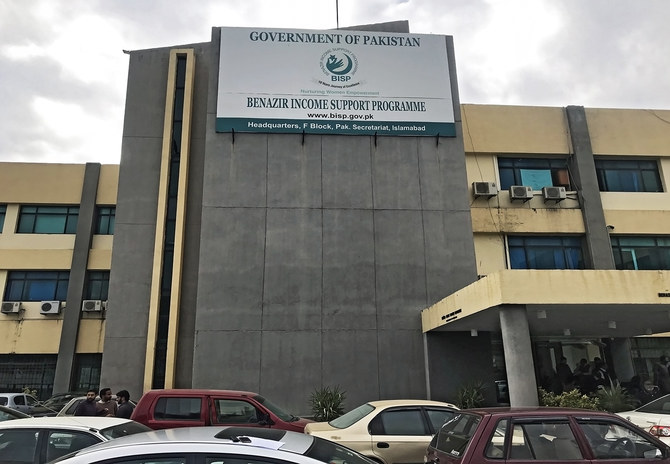ISLAMABAD: In November, during a huddle of parliamentarians from the ruling party, Pakistani Tehreek-e-Isaaf (PTI), a lawmaker launched an unexpected attack on the government’s flagship poverty reduction program.
He took aim directly at the soft-spoken Dr. Sania Nishtar, special assistant to Prime Minister Imran Khan on social protection and poverty alleviation, accusing her of rolling out initiatives benefiting the voters of his political opponents, Dr. Nishtar recalls, instead of his own. A few other voices chimed in.
There is “a small minority” within the cabinet, the special assistant conceded to Arab News this week, which is used to the old way of doing things-- politicizing social protection programs.
“Programs like these were in the past used for political purposes, for creating a vote bank,” she said, seated in her office in the capital, Islamabad.
“The prime minister is very clear that our program will run apolitically. And while I am here, it cannot be otherwise,” she said.
The South Asian country of 208 million people, has a huge poverty problem. According to its last national survey conducted in 2015-16, 38.4 percent of Pakistan’s population lives in multidimensional poverty. This means not only do they have low incomes, they do not have access to health, electricity, clean water and education, among other things. A majority of those who live in extreme poverty are in the country’s largest (area-wise) province, Balochistan, in southwestern Pakistan.
An updated poverty survey is expected to be completed this year.
In March last year, Pakistan’s newly elected government launched its largest and most ambitious poverty alleviation plan, the Ehsaas program. Ehsaas is an umbrella platform with over 134 pro-poor policy initiatives, aimed at widows, the homeless, orphans, laborers, students, farmers and the elderly.
It was a tough task. The doctor knew she was staking her legacy on a plan which would face resistance from political quarters. When the prime minister first approached her to join his cabinet, she said she hesitated, but agreed once she was promised complete freedom without political interference, to carry out her work.
“Prime Minister Imran Khan came across to me as someone who was genuinely interested in the problems of the poor. I am, to this day, never stopped from doing what is right. And if I did not have the prime minister’s complete support, I would not be sitting here today,” she said.
Since March, one after another, an initiative is rolled out every month in much-publicized ceremonies personally attended by Khan. Some ongoing projects include soup kitchens and shelter homes for the homeless and the Kifalat program, through which women, who do not have any other source of income, receive a small monthly stipend of Rs. 2,000 ($13).
Dr. Nishtar is powering through, while the pushback has only intensified.
Last month, the doctor announced the removal of over 800,000 people from the Benazir Income Support Program (BISP), a cash transfer plan launched in 2008 for women who do not have any source of income. The BISP now falls under Ehsaas.
The names excluded, Dr. Nishtar told reporters, were “undeserving” of the income support.
Upward of 140,000 of the claimants were government employees against whom disciplinary action would be taken, she said. Others listed on the BISP had homes and cars registered under their names while some had made foreign visits in the last few years.
Soon after, leader of major opposition party Pakistan People’s Party (PPP), Bilawal Bhutto-Zardari, called the exclusion of names an “economic attack on poor women.”
Recently, a member of the national assembly from the ruling party walked into the doctor’s office to complain about a woman employed at his home who was removed from the BISP only because she traveled to perform Umra.
“I asked him, does the woman live with you? He said yes. Do you provide her food and pay her medical bills? He said yes. I then asked him, don’t you think another woman who has nothing is more eligible for the program?” Dr. Nishtar said and added: “The BISP is for the poorest of the poor.”
Combined, the BISP and Khifalat aim to support seven million women in Pakistan. Ayesha Bano, who lives in the northwestern Khyber Pakhtunkhwa province, said she had been on the BISP for over a decade.
“Without it my household would be difficult to run,” she told Arab News.
Previously, parliamentarians were given thousands of BISP forms each, to fill out on behalf of women they thought were deserving. These forms were often misused. But that has now changed. The doctor and her team, through non-governmental organizations and analytical data, is identifying those who deserve the Rs. 5,000 quarterly as a stipend. Last week, Dr. Nishtar announced that quarterly figure would be increased to Rs. 6000 ($40).
She said that until now, she had only zeroed in on the federal and provincial governments, while other state departments still remained to be examined, to weed out officials exploiting the BISP.
“They [officials] are not giving me data because they know what I intend to do,” she said.
Political and bureaucratic challenges aside, there is one other problem – money. Social welfare programs like Ehsaas are expensive and require government revenue in order to bankroll them. In the last budget, the government allocated Rs. 80 billion to the initiative. This figure could be increased to Rs. 120 billion this year.
“Elaborate social welfare systems require the governments to collect a large proportion of their GDP’s in taxes,” explains Shahrukh Wani, a prominent Pakistani economist.
“Pakistan doesn’t collect enough (tax) to provide a basic level of service delivery, let alone enough under which it can provide comprehensive social protections. It is unlikely any such program can work in the absence of a large and extensive tax infrastructure.”
Dr. Nishtar agrees that Pakistanis out of the tax net have a connection with how the program is funded and its effectiveness.
“Social protection programs are largely funded through revenue,” she said. “The predictability of the budget has to be there.”
'Some in PM cabinet want to use Ehsaas for votes' says Pakistan poverty alleviation chief
https://arab.news/m6p5r
'Some in PM cabinet want to use Ehsaas for votes' says Pakistan poverty alleviation chief
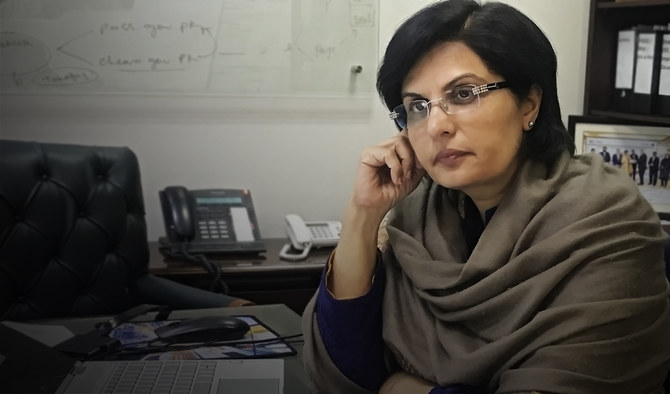
- Dr. Sania Nishtar says there are some in PM cabinet who want to use program for political gain
- National survey concluded 38.4 percent of Pakistanis live in multidimensional poverty
X working with Pakistan to ‘understand concerns’ over ban

- X has been rarely accessible since Feb. 17, when jailed ex-PM Khan’s party called for protests over poll results
- Interior Ministry said X was blocked on security grounds, according to report submitted to Islamabad High Court
ISLAMABAD: Social media platform X said Thursday it would work with Pakistan’s government “to understand its concerns” after authorities insisted an ongoing two-month ban was based on security grounds.
The platform, formerly known as Twitter, has been rarely accessible since February 17, when jailed former prime minister Imran Khan’s party called for protests following a government official’s admission of vote manipulation in the February election.
“We continue to work with the Pakistani Government to understand their concerns,” X’s Global Government Affairs team posted, in their first comments since the site was disrupted.
The Interior Ministry on Wednesday said X was blocked on security grounds, according to a report submitted to the Islamabad High Court where one of several challenges to the ban is being heard.
On the same day, the Sindh High Court ordered the government to restore access to social media platform X within a week.
“The Sindh High Court has given the government one week to withdraw the letter, failing which, on the next date, they will pass appropriate orders,” Moiz Jaaferi, a lawyer challenging the ban, told AFP.
The court’s full decision is expected to be published this week.
Both the government and the Pakistan Telecommunication Authority (PTA) had for weeks refused to comment on the outages.
“It is the sole prerogative and domain of the federal government to decide what falls within the preview of terms of ‘defense’ or ‘security’ of Pakistan and what steps are necessary to be taken to safeguard National Security,” said the interior ministry’s report, submitted by senior official Khurram Agha.
The interior ministry suggested intelligence agencies were behind the order.
The closure of a social media service “when there is request from any security or intelligence agency” is “well within the scope of provisions of the PTA act,” the report said.
Digital rights activists, however, said it was designed to quash dissent after February 8 polls that were fraught with claims of rigging.
Access to X has been sporadic, occasionally available for short cycles based on the Internet service provider, forcing users to use virtual private networks.
Mobile services were cut across Pakistan on election day, with the interior ministry also citing security reasons.
It was followed by a long delay in issuing voting results, giving rise to allegations of tampering.
Khan’s opposition party had already faced heavy censorship in the weeks before the election, banned from television channels and from holding rallies, forcing its campaign online.
Despite the crackdown, his party won the most seats but was kept from power by a coalition of rival parties that had the backing of the military.
33 killed, 46 injured in recent torrential rains in northwest Pakistan
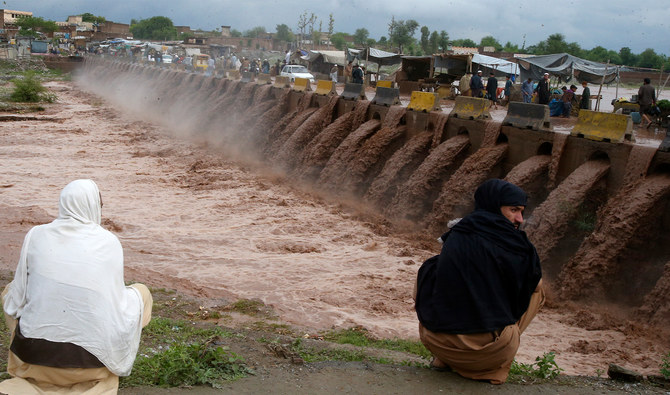
- Pakistan has received heavy rains in last three weeks that have triggered landslides, flash floods in several areas
- Authorities have warned of another spell of heavy rains in the Khyber Pakhtunkhwa province from April 17 till April 21
ISLAMABAD: At least 33 people have been killed and another 46 injured in various rain-related incidents in Pakistan’s northwestern Khyber Pakhtunkhwa (KP) province in the last six days, the Provincial Disaster Management Authority (PDMA) said on Thursday.
The rains that began last Friday have completely destroyed 336 houses and partially damaged another 1,606 in different districts across the province, according to the PDMA.
The incidents occurred in Khyber, Upper and Lower Dir, Upper and Lower Chitral, Swat, Bajaur, Shangla, Karak, Tank, Mardan, Peshawar, Charsadda, Hangu, Battagram, Dera Ismail Khan and other districts.
“The deceased include 17 children, eight men, eight women, while the injured included 32 men, six women and eight children,” the PDMA said in its daily situation report on Thursday.
On Wednesday, the authority warned of another spell of heavy rains in the province from April 17 till April 21, which could trigger landslides and flash floods.
“The district administrations should take proactive and immediate measures before the second spell of the rains begins … and ensure the availability of small and large machinery,” it added.
The PDMA said it had issued Rs50 million to the administration of 12 affected districts for financial assistance to families of those who lost their lives in the recent rains.
“Rs80.1 million have been released by the PDMA since March 29 to the administration of various districts to deal with the emergency situation,” the authority added.
Pakistan has received heavy rains in the last three weeks that have triggered landslides and flash floods in several parts of the South Asian country.
The eastern province of Punjab has reported 21 lighting- and roof collapse-related deaths, while Balochistan, in the country’s southwest, reported 10 deaths as authorities declared a state of emergency following flash floods.
In 2022, downpours swelled rivers and at one point flooded a third of Pakistan, killing 1,739 people. The floods also caused $30 billion in damages, from which Pakistan is still trying to rebuild. Balochistan saw rainfall at 590 percent above average that year, while Karachi saw 726 percent more rainfall than usual.
Pakistan’s Lahore hosts 24th edition of Asian Forum’s tech innovation event
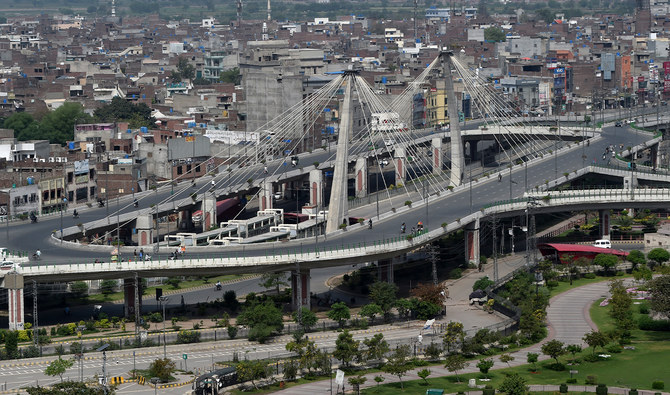
- The three-day exhibition is set to fetch nearly $500 million investment from a dozen countries
- These companies participating in the expo include Microsoft, Inbox, Lenovo, HP, NetSol and Dell
ISLAMABAD: Pakistan’s eastern city of Lahore is set to host the 24th edition of Asian Forum’s Information Technology Commerce Network (ITCN) today, on Thursday, Pakistani state media reported.
State Minister for Information Technology Shaza Fatima will be the chief guest, while Digital Cooperation Organization (DCO) Secretary-General Deemah Al-Yahya will be guest of honor on the opening day of summit at Lahore’s Expo Center.
The main sessions include Artificial Intelligence Summit, Global Security Symposium, Gaming and Scholars Roundtable, Investor Summit, Freelancer Summit, Made in Pakistan Roundtable Conference, the state-run Radio Pakistan broadcaster reported.
“In this edition, a delegation of international investors belonging to twelve counties will participate along with an investment of five hundred million dollars,” the report read.
“Over seven hundred stalls will be established and renowned international and national technology companies will participate in this event.”
These companies include Microsoft, Inbox, Red Hat, TP-Link, Lenovo, HP, NetSol, Abacus and Dell, according to the report.
The event is being jointly supported by the Pakistani Ministry of Information Technology and Telecommunication, Pakistan Telecommunication Authority, Special Investment Facilitation Council (SIFC), Pakistan Software Export Board and Pakistan Software Houses Association.
Pakistan wants to re-engage with Middle Eastern banks to boost investment — finance minister
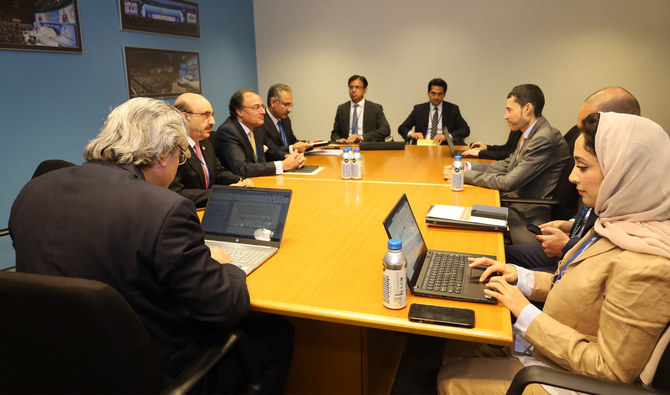
- Statement came during Mohammad Aurangzeb’s meeting with his Emirati counterpart on sidelines of his US visit
- The Pakistani finance minister briefed about priority areas of taxation, energy and privatization of state entities
ISLAMABAD: Finance Minister Muhammad Aurangzeb on Wednesday met with his Emirati counterpart and expressed his country’s desire to re-engage with Middle Eastern banks to boost investment in Pakistan, the Pakistani finance ministry said.
Aurangzeb’s meeting with UAE’s Minister of State for Financial Affairs Mohamed bin Hadi Al Hussaini came on the sidelines of his visit to the United States to meet International Monetary Fund (IMF) and World Bank officials.
The Pakistani finance minister acknowledged long-standing brotherly ties between Pakistan and the United Arab Emirates (UAE) and appreciated the Gulf country’s support to help Pakistan deal with its economic challenges.
“He highlighted Pakistan’s firm resolve to address economic challenges and create a conducive environment for sustainable growth and investment,” the Pakistani finance ministry said in a statement.
“He also expressed Pakistan’s keen interest to re-engage with Middle Eastern Banks to revive their interest in potential investment opportunities in the country.”
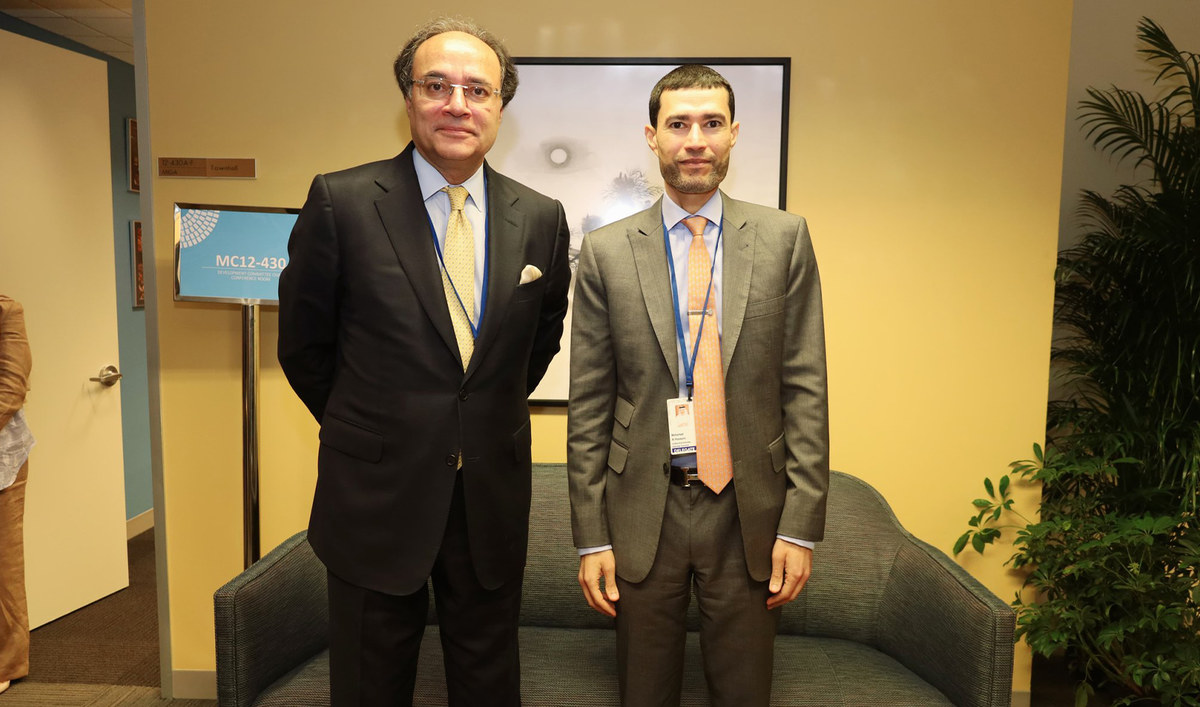
He said his government intended to continue with reforms initiated under a $3 billion IMF program in priority areas of taxation, energy and privatization of state-owned enterprises (SOEs), according to the statement.
Aurangzeb arrived in Washington on Sunday to participate in spring meetings organized by the IMF and World Bank. His tour is an important one for the South Asian country as the ongoing nine-month, $3 billion loan program with the IMF designed to tackle a balance-of-payments crisis, is set to expire this month.
With the final $1.1 billion tranche of that deal likely to be approved later this month, Pakistan has begun negotiations for a new multi-year IMF loan program worth “billions” of dollars, according to the finance ministry.
Pakistan seeks at least a three-year IMF program and plans to continue with necessary policy reforms to rein in deficits, build up reserves, and manage soaring debt servicing.
On Wednesday, Aurangzeb attended the Middle East and North Africa (MENA) Ministers and Governors meeting with the IMF managing director and highlighted geo-economic fragmentation and its impact on Pakistan.
“He thanked IMF, MDBs (multilateral development banks) and its time-tested sincere bilateral partners for their support in helping the country respond to unprecedented challenges,” Aurangzeb’s ministry said in a separate statement.
“He further underscored aggressive reforms including broadening the tax net, privatizing loss making SOEs, expanding social safety net and facilitating the private sector.”
The minister underlined the importance of rechanneling special drawing rights (SDRs), reviewing surcharges policy, and prioritizing the Resilience and Sustainability Trust (RST) in view of climate vulnerabilities.
“The minister called for a more proactive and responsive Global Financial Safety Net to tackle the elevated risks,” the statement read.
“He welcomed the renewed emphasis of the Fund on Capacity Building through Regional Capacity Development Centers (RCDCs).”
During the engagements, Aurangzeb also met with Multilateral Investment Guarantee Agency (MIGA) Executive Vice President Hiroshi Matano and appreciated the Agency’s continued support to Pakistan in attracting foreign investments.
“The minister discussed the ongoing economic reforms, investment climate and measures to enhance investor confidence in Pakistan,” his ministry said.
Australia mulls citizenship for Pakistani guard in Sydney mall attack
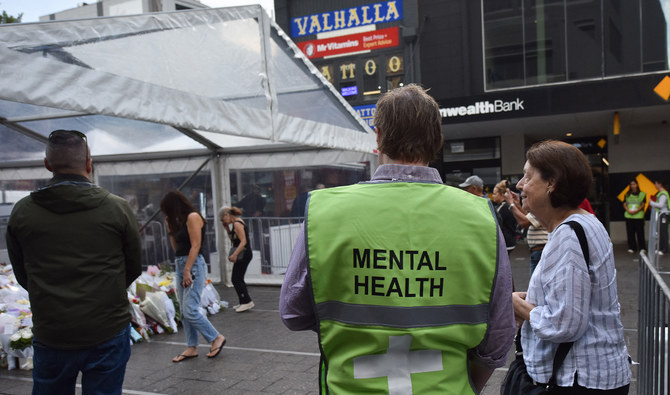
- The guard, Muhammad Taha, reportedly said he believed he ‘deserved recognition, consideration for citizenship’ after being stabbed
- He was attacked just after fellow Pakistani security guard, Faraz Tahir, one of the six people killed at the Westfield shopping complex
SYDNEY: Australia’s prime minister said Thursday he will consider granting citizenship to a Pakistani security guard wounded in the deadly Sydney shopping center knife attack.
The guard, Muhammad Taha, reportedly said he believed he “deserved recognition and consideration for citizenship” after being stabbed.
In a bedside interview with The Australian, Taha said he was attacked just after fellow Pakistani security guard Faraz Tahir, one of the six people killed at the Westfield shopping complex in Bondi Junction.
Taha has a graduate visa due to expire in less than a month, the paper said.
The guard reportedly noted that Frenchman Damien Guerot, since dubbed “bollard man,” had been offered permanent residency after video shared on social media showed him using a bollard to fend off the attacker, Joel Cauchi.
Asked in a radio interview if the Australian government would entertain Taha’s citizenship request, Prime Minister Anthony Albanese said: “Yes, we certainly will.”
Albanese described the killing of Faraz Tahir as a “tragedy.”
“This other person, Muhammad Taha, he confronted this guy, the perpetrator, Joel Cauchi, on Saturday. And it just shows extraordinary courage,” the prime minister said.
Both men put themselves in danger to protect Australians they did not know, Albanese said.
“That’s the sort of courage that we want to say thank you to, frankly.”
Albanese said Guerot would receive permanent residency, which he had been seeking, on Thursday.
French President Emmanuel Macron on Tuesday hailed Guerot and his fellow Frenchman Silas Despreaux for trying to stop the mall attacker.



